Filter by

Blowout in the Gulf :the BP oil spill disaster and the future of energy in Am…
Explains both the disaster and the decisions that led up to it and argues that for the future the emphasis needs to be on prevention and that risk-management policies be based on better understandings of humans and hardware.OCLC-licensed vendor bibliographic record.
- Edition
- -
- ISBN/ISSN
- 9780262294126
- Collation
- 1 online resource (xiii, 254 pages) :illustrations
- Series Title
- -
- Call Number
- -
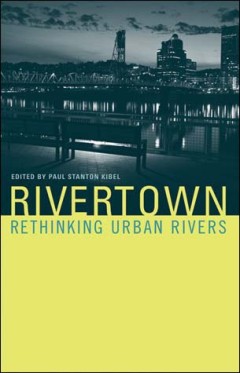
Rivertown :rethinking urban rivers
Examines efforts in Los Angeles, Washington D.C., Chicago, Salt Lake City, San Jose, and other cities to reclaim postindustrial urban riverside land for use as open space, parks and housing.OCLC-licensed vendor bibliographic record.
- Edition
- -
- ISBN/ISSN
- 9780262277075
- Collation
- 1 online resource (216 pages) :illustrations, maps.
- Series Title
- -
- Call Number
- -
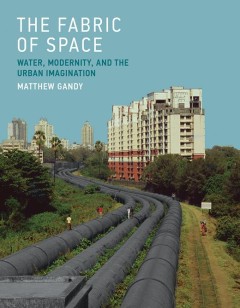
The fabric of space: Water, modernity, and the urban imagination
Water lies at the intersection of landscape and infrastructure, crossing between visible and invisible domains of urban space, in the tanks and buckets of the global South and the vast subterranean technological networks of the global North. In this book, Matthew Gandy considers the cultural and material significance of water through the experiences of six cities: Paris, Berlin, Lagos, Mumbai, …
- Edition
- -
- ISBN/ISSN
- 9780262321761
- Collation
- -
- Series Title
- -
- Call Number
- -
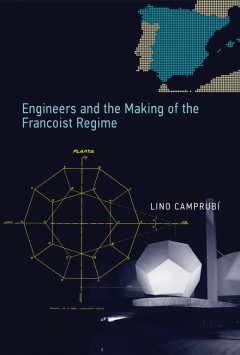
Engineers and the making of the Francoist regime
In the 20th century, science and technology became central to territorial transformation and in turn to state building. This was no less true for the Francoist regime. Engineers were not just working 'under' the dictatorship, but became active participants within it. This book traces concrete material objects in their way from laboratories onto the Spanish landscape. The material history of the…
- Edition
- -
- ISBN/ISSN
- 9780262323222
- Collation
- 1 online resource (xiii, 298 pages) :illustrations, maps.
- Series Title
- -
- Call Number
- -
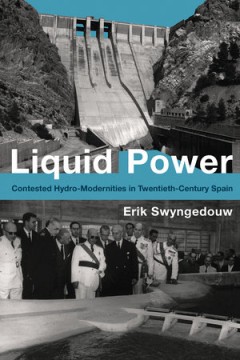
Liquid power :water and contested modernities in Spain, 1898-2010
Erik Swyngedouw explores how water becomes part of the tumultuous processes of modernisation and development. Using the experience of Spain as a lens to view the interplay of modernity and environmental transformation, he shows that every political project is also an environmental project. Offering an innovative perspective on the relationship of nature and society, 'Liquid Power' illuminates t…
- Edition
- -
- ISBN/ISSN
- 9780262326957
- Collation
- 1 online resource (xiv, 301 pages) :illustrations.
- Series Title
- -
- Call Number
- -
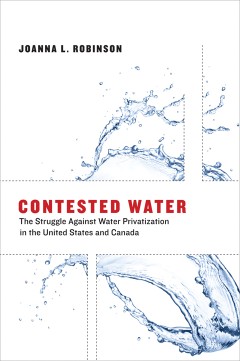
Contested water :the struggle against water privatization in the United State…
"Attempts by local governments to privatize water services have met with furious opposition. Activists argue that to give private companies control of the water supply is to turn water from a common resource into a marketized commodity. Moreover, to cede local power to a global corporation puts communities at the center of controversies over economic globalization. In Contested Water, Joanna Ro…
- Edition
- -
- ISBN/ISSN
- 9780262313612
- Collation
- 1 online resource.
- Series Title
- -
- Call Number
- -

Winning together :the natural resource negotiation playbook
Strategies for transboundary natural resource management; winner of Harvard Law School's Raiffa Award for best research of the year in negotiation and conflict resolution.OCLC-licensed vendor bibliographic record.
- Edition
- -
- ISBN/ISSN
- 9780262343633
- Collation
- 1 online resource (viii, 322 pages) :illustrations, maps.
- Series Title
- -
- Call Number
- -

Flint fights back :environmental justice and democracy in the Flint water crisis
An account of the Flint water crisis shows that Flint's struggle for safe and affordable water is part of a broader struggle for democracy. When Flint, Michigan, changed its source of municipal water from Lake Huron to the Flint River, Flint residents were repeatedly assured that the water was of the highest quality. At the switchover ceremony, the mayor and other officials performed a celebrat…
- Edition
- -
- ISBN/ISSN
- 9780262352932
- Collation
- 1 online resource (432 pages) :illustrations
- Series Title
- -
- Call Number
- -

Water, Race, and Disease
A qualitative and quantitative analysis of the effect of public water and sewer systems on African American life expectancy in the Jim Crow era.Why, at the peak of the Jim Crow era early in the twentieth century, did life expectancy for African Americans rise dramatically? And why, when public officials were denying African Americans access to many other public services, did public water and se…
- Edition
- -
- ISBN/ISSN
- 9780262285186
- Collation
- 1 online resource (xvii, 251 pages) :illustrations.
- Series Title
- -
- Call Number
- -

Swimming Upstream: Collaborative Approaches to Watershed Management
In recent years, water resource management in the United States has begun a shift away from top-down, government agency-directed decision processes toward a collaborative approach of negotiation and problem solving. Rather than focusing on specific pollution sources or specific areas within a watershed, this new process considers the watershed as a whole, seeking solutions to an interrelated se…
- Edition
- -
- ISBN/ISSN
- 9780262282789
- Collation
- 1 online resource (xvi, 327 pages) :illustrations, maps.
- Series Title
- -
- Call Number
- -
 Computer Science, Information & General Works
Computer Science, Information & General Works  Philosophy & Psychology
Philosophy & Psychology  Religion
Religion  Social Sciences
Social Sciences  Language
Language  Pure Science
Pure Science  Applied Sciences
Applied Sciences  Art & Recreation
Art & Recreation  Literature
Literature  History & Geography
History & Geography